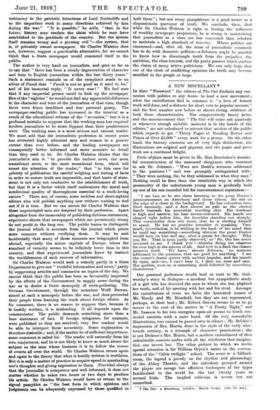A NEW MISCELLANY *
IN their "Foreword " the editors of The Owl disclaim any con- nexion with politics or any desire to lead a new movement ;
what the contributors find in common is " a love of honest work well done, and a distaste for short cuts to popular success,"
and the first number now before us shows strong evidence of both these characteristics. The comparatively heavy price, and the -announcement that " The Owl will come out quarterly
or whenever enough suitable material is in the hands of the editors," are not calculated to attract that section of the public which expects to get " Thirty Pages of Reading Matter and Prizes of Over £5,000 " every week for a penny. On the other hand, the literary contents are of very high distinction, the illustrations are original and piquant, and the paper and press work are a continual delight.
Pride of place must be given to Mr. Max Beerbohm's wonder- ful reconstruction of the unnamed clergyman who ventured to ask Dr. Johnson : " Were not Dodd's sermons addressed to the passions ? " and was promptly extinguished with : " They were nothing, Sir, be they addressed to what they may." Nothing could be finer than the inimitable way in which the personality of the unfortunate young man is gradually built up-out of his one recorded bid for conversational reputation:-
" I see him as he sits there listening to the great Doctor's pronouncement on Atterbury and those others. He site on the edge of a chair in the background. He has colourless eyes, fixed earnestly, and a face almost as pale as the clerical bands beneath his somewhat receding chin. His forehead is high and narrow, his hair mouse-coloured. His hands are clasped tight before him, the knuckles standing out sharply. This constriction does not mean that he is steeling himself to speak. He has no positive intentior of speaking. Very much, nevertheless. is he wishing in the back of his mind that he could say something—something whereat the great Doctor would turn on him and say, after a pause for thought, Why yes, Sir. That is most justly observed,' or ' Sir, this has never occurred to me. I thank you '—thereby fixing the observer for ever high in the esteem of all. And now in a-flash the chance presents itself. ` We have,' shouts Johnson, no sermons addressed to the passions, that are good for anything.' I see the curate's frame quiver with sudden impulse, and his mouth fly open, and—no, I can't bear it, I shut my eyes- and ears. But audible, even so, is something shrill followed by something thunderous."
Our personal preference would lead us next to Mr. Gals- worthy's story in dialogue—a mordant but sympathetic study of a girl who has deserted the man to whom she has plighted her troth, and of his- meeting with her and his rival. Amongst
the contributors of verse we have the honoured names of Mr. Hardy and Mr. Masefield, but they are not represented, perhaps, at their best ; Mr. Robert Graves seems to us to go nearer to the root of the matter in " A Frosty Night," and Mr. Sasaoon in-his two energetic open-air poems to touch con- cealed emotion with a surer hand. Of the very remarkable illustrations, two cannot be passed over in silence : Mr. Belcher's impression of Mrs. Harris, done in the style of the early nine- teenth century, is a triumph of character penetration ; she is not Dickens's Mrs. Harris, but a modern embodiment of that
redoubtable nominie umbra with all the attributes that imagina- tion can invest her. The other picture to which we invite
special attention is Sir William Orpen's satire on the conven- tions of the " Celtic twilight " school. The scene is a billiard- room, the legend a parody on the rhythm and phraseology of the Abbey Theatre, and the onlookers grouped around the player are savage but effective burlesques of the types familiarised to the world for the last twenty years as normal Irish. The implied criticism is severe but not unmerited.
• Rlis Owl a Miscellany. London : Martin Becker. [105. ed. net.]






































 Previous page
Previous page